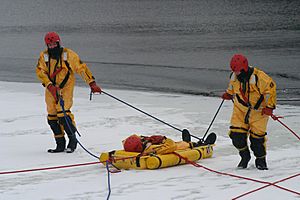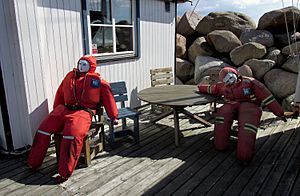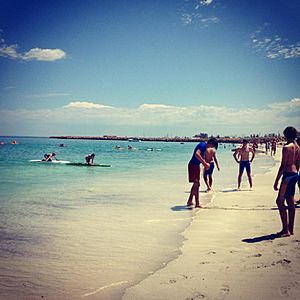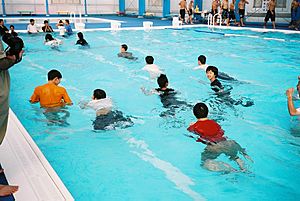Lifesaving facts for kids
Lifesaving is all about helping people in danger. It includes rescuing them, helping them breathe again (resuscitation), and giving them first aid. While we often think of water safety and saving people from drowning, lifesaving can also mean ice rescue, flood rescue, or even helping in other medical emergencies.
Lifesaving is also a sport! Lifesavers compete to show off their skills, speed, and teamwork. When lifesaving happens mostly in the ocean, it's called surf lifesaving.
People who volunteer their time for lifesaving are called lifesavers. Those who are paid to do it as a job are called lifeguards.
Contents
The History of Lifesaving
How Lifesaving Started
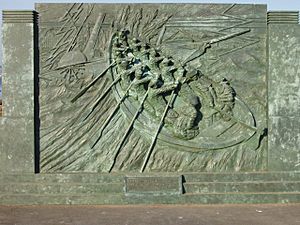
The very first organization dedicated to saving lives from shipwrecks was started in England in 1824. It was called the Royal National Institution for the Preservation of Life from Shipwreck. A man named Sir William Hillary created it.
Sir William lived on the Isle of Man and saw how dangerous the Irish Sea could be. Many ships crashed near the island. He wanted to create a national service with trained crews to help. At first, the navy wasn't interested.
But Sir William asked kind people in London for help. With the support of two Members of Parliament, his plan worked! The "National Institution for the Preservation of Life from Shipwreck" was founded in 1824.
One of their first rescues was the ship St George, which crashed near Douglas Harbour. Sir William himself helped save everyone on board. About 30 years later, the organization changed its name to the Royal National Lifeboat Institution (RNLI). The first new lifeboat they built was placed in Douglas to honor Sir William's hard work.
Lifesaving Spreads Around the World
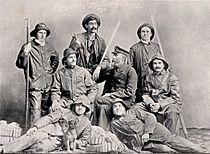
Soon, other countries started their own lifesaving services. Belgium started one in 1838, Denmark in 1848, and the United States in 1848. Sweden followed in 1856, France in 1865, and Germany in 1885. Turkey, Russia, Italy, and Spain also created their own groups.
In 1891, the Royal Life Saving Society was formed to connect lifesaving clubs in Britain and Ireland. It grew and started helping in Canada and Australia by 1894. In Germany, the DLRG was founded in 1913.
The first big meeting about lifesaving from different countries happened in Marseilles, France, in 1878. But it wasn't until 1910 that the first international lifesaving organization, FIS (Fédération Internationale de Sauvetage Aquatique), was created.
Later, in 1971, Australia, Great Britain, New Zealand, South Africa, and the United States formed another international group called World Life Saving (WLS). In 1993, FIS and WLS joined together to create a new organization: the International Life Saving Federation (ILS). Its main office is in Leuven, Belgium.
The International Life Saving Federation
The ILS was officially started on March 27, 1910, in Paris, France. The ILS is known as the main group working worldwide to "prevent drowning." It brings together national lifesaving organizations to make water safer, improve water rescue, and promote lifesaving as a sport.
What Lifesavers Do
Surf lifesaving began in Australia and is often just called "lifesaving" there. It focuses on preventing drowning and rescuing people at beaches.
But general lifesaving isn't just for beaches! It aims to make water safe everywhere. This includes ponds, lakes, rivers, swimming pools, and even in homes and schools. That's why countries without coastlines, like Switzerland, Austria, and the Czech Republic, are also members of the ILS.
Many lifesavers are volunteers. They often work from a club house. They train people to become qualified lifesavers or lifeguards. They also teach the public about water safety.
Lifesaving as a Sport
Lifesaving has become a popular sport in many countries. Competitions can happen indoors in swimming pools or outdoors on beaches. This is similar to how you have pool lifeguards and beach lifeguards.
Lifesaving is an official sport in the World Games. These games feature sports recognized by the IOC that are not yet part of the Olympic program.
Cardiopulmonary Resuscitation (CPR)
Cardiopulmonary resuscitation, or CPR, is a very important lifesaving skill. It helps someone whose heart has stopped or who has stopped breathing. You can learn CPR easily with this simple guide:
| ADULT and older CHILD | CHILD 1 to 8 yrs | BABY up to 1 yr | |
|---|---|---|---|
| CPR ratios for 1 person | 30 pushes to 2 breaths | 30 pushes to 2 breaths | 30 pushes to 2 puffs |
| CPR ratios for 2 persons | 30 pushes to 2 breaths | 30 pushes to 2 breaths | 30 pushes to 2 puffs |
| Chest pressure | 2 hands | 1-2 hands | 2 fingers |
| CPR push rate | About 100 per minute | About 100 per minute | About 100 per minute |
| Push depth | One-third of a chest depth | One-third of a chest depth | One-third of a chest depth |
| Head tilt | Maximum | Minimum | None |
| Rescue breaths | 2 full breaths | 2 small breaths | 2 puffs |
| Breathing rate | 1 breath in 1 second | 1 small breath in 1 second | 1 puff in 1 second |
DRSABCD Method
When someone collapses, you need to quickly figure out what help they need. The DRSABCD method helps you do this step-by-step:
| D | Check for Dangers around the person. |
|---|---|
| R | Check their Response. Are they awake? Can they talk? |
| S | Send for help. Call emergency services right away! |
| A | Clear and open their Airway (make sure nothing is blocking their throat). |
| B | Check for normal Breathing. Are they breathing normally? |
| C | Give 30 chest Compressions (pushes) at 100 per minute, then 2 rescue breaths. |
| D | Defibrillate - use an AED (Automated External Defibrillator) as soon as you can. Follow its instructions. |
See also
- Lifeguard
- DLRG
- Commonwealth Pool Lifesaving Championships
- Rashtriya Life Saving Society (India)
- Royal Life Saving Society Australia
- Royal Life Saving Society Commonwealth
- Royal Life Saving Society of Canada
- Surf lifesaving
- Surf ski
- United States Lifesaving Association
- United States Life-Saving Service
- Adolph Kiefer
 | May Edward Chinn |
 | Rebecca Cole |
 | Alexa Canady |
 | Dorothy Lavinia Brown |


